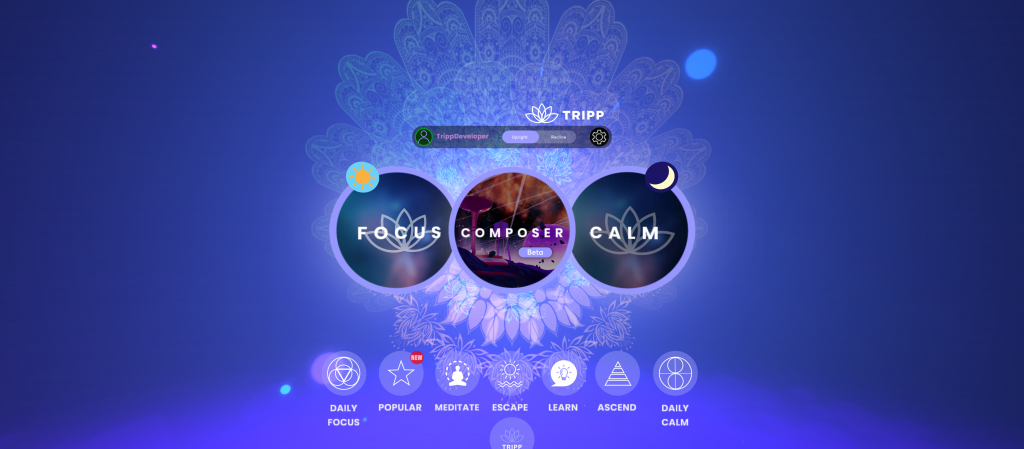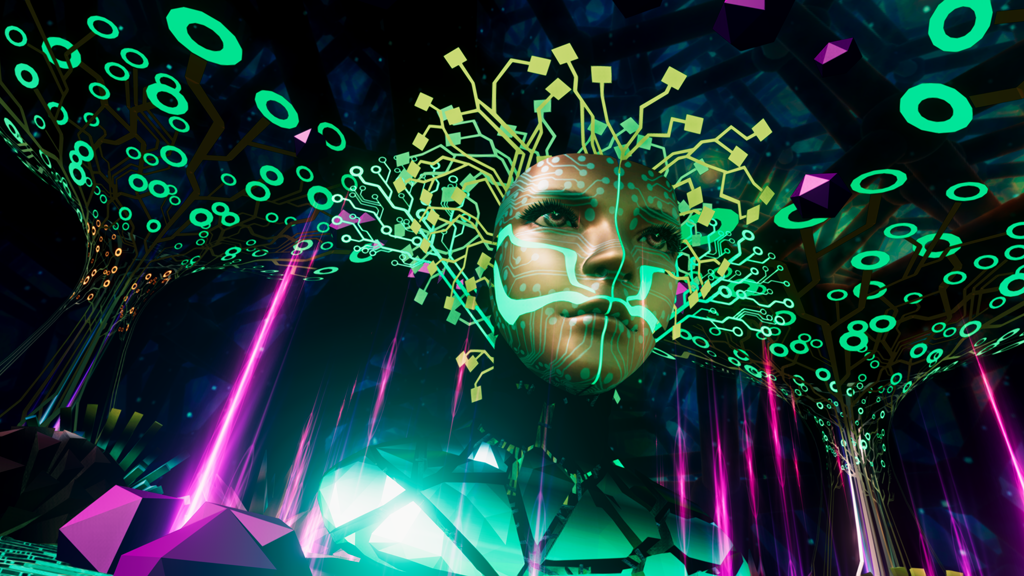PSYCHEDELICS
Long read: Psychedelics and VR – A new therapeutic frontier?
Our idea of therapy has changed drastically over the past decade. Gone is the image of the balding, bespectacled male therapist in a brown suit. In its place, virtual guided meditation, CBT apps and on-demand Zoom counselling.
Now, new therapies are emerging which simulate the psychedelic experience. Among them, TRIPP – a virtual reality (VR) meditation app that arrives just as psychedelic medicines break through the collective consciousness.
TRIPP is an immersive VR meditation platform that ‘combines proven meditation techniques, flow-inducing gameplay, binaural audio and breath visualization to transform how you feel.’
The app was co-created by CEO Nanea Reeves. The three-time TEDx speaker has a long background in gaming technology.
Her CV includes a stint at Electronic Arts (EA) and early investment in the Oculus VR headset, which she trialled alongside late-husband Vic, TRIPP co-founder Zack Norman and her cousin, Keanu.
Nanea’s therapy journey began in her teens.
“My mother was a heroin addict. I experienced a lot of stress as a kid from a deep sense of responsibility for two younger sisters,” she says.
“I believe meditation saved my life.
“It wasn’t something I talked about. I was actually embarrassed about it. But a therapist taught me how to
do it and I believe it enabled me to rewire my decision framework.”

Nanea also relied on gaming. She says that games gave her a sense of control that was missing from her life. This passion for the technology would shape her career and TRIPP itself.
“We’ve found that giving people a sense of control over their environment has some positive benefits, especially if you feel your real-world environment is out of control. That’s how I felt as a kid.
“I’m sure as a population, there are a lot of things we feel that we can’t control in our lives right now. Online gaming has exploded during COVID and solutions like TRIPP filled a void there.
‘It’s been interesting to take that idea and figure out how we can use it in ways that can be beneficial to people.”
Anonymised data has revealed different usage patterns across the userbase.
There are the diehards who have been using TRIPP regularly for months or longer. Then there are others who may only be on the platform for two or three weeks, such as the ‘New Year’s Resolution Crew,’ as Nanea calls them, who may need a little more encouragement.
“If we look at our own patterns of how we turn to meditation, people like myself have it integrated throughout the day and have had a lifetime of practice. Other people do it under duress or stress and turn to it when they need it,” Nanea says.
“The benefit of using technology in these positive use cases is that we can take all the tactics that technology companies have used to manipulate you to buy a product and stay engaged, but use them with beneficial intention.”
There is a clear overlap between apps like TRIPP and the new wave of psychedelic therapies.
Earlier this year, UK researchers published promising trial data which found psilocybin to be as effective as a leading antidepressant. Barriers to psychedelic medicine are slowly being eroded but it will be many years before we see a psychedelic antidepressant on the NHS.
Apps like TRIPP which simulate the psychedelic experience are helping to fill the void in a more accessible way.
“I’ve gone to Tibet and done 10 hours of meditation a day over several weeks,” Nanea says. “You can achieve these altered states of consciousness. I found them very helpful, but it’s incredibly challenging.
“I took everything I’d learned throughout the years and brought it all together into something else to see if we could trigger altered states in VR.”

TRIPP began life as a mindfulness app. But that’s just the beginning. The team are exploring the ‘Empower TRIPP’ designed to build confidence, as well as a sleep TRIPP, which is one of the top requests the team has received.
And while they cannot make any therapeutic claims just yet, studies are well underway.
Nanea says:
“Some have completed their phase one pilots and they’re up and running with double-blind or randomised- controlled trials (RCTs).
“We received a fast-track grant from the National Institute of Drug Abuse for addiction recovery, which obviously has a deep personal connection to my mission.
“I’m also really excited about palliative care and end-of-life treatment. And we have a very exciting study up and running with the New York Office of Mental Health with the same team that’s working with (non-profit psychedelic research organisation) MAPS.”
“So a lot of our research initiatives match the psychedelic industry’s focus areas and where they lean into their applications.”
Psychedelic clinics are beginning to open up across the US and now the UK with the Awakn clinics in London and Bristol. Is there scope to combine the two therapies?
“We have seen some organic adoption of our consumer product in the clinics. They’re downloading our application and bringing Oculus Quest into their psychedelic clinics and ketamine clinics and using it as an anxiety-reduction tool.
“I think in the future, you’ll see us focus on that in a more commercialised manner.”
This story features in Issue 12 of The CANNAVIST. Now available on Readly.










